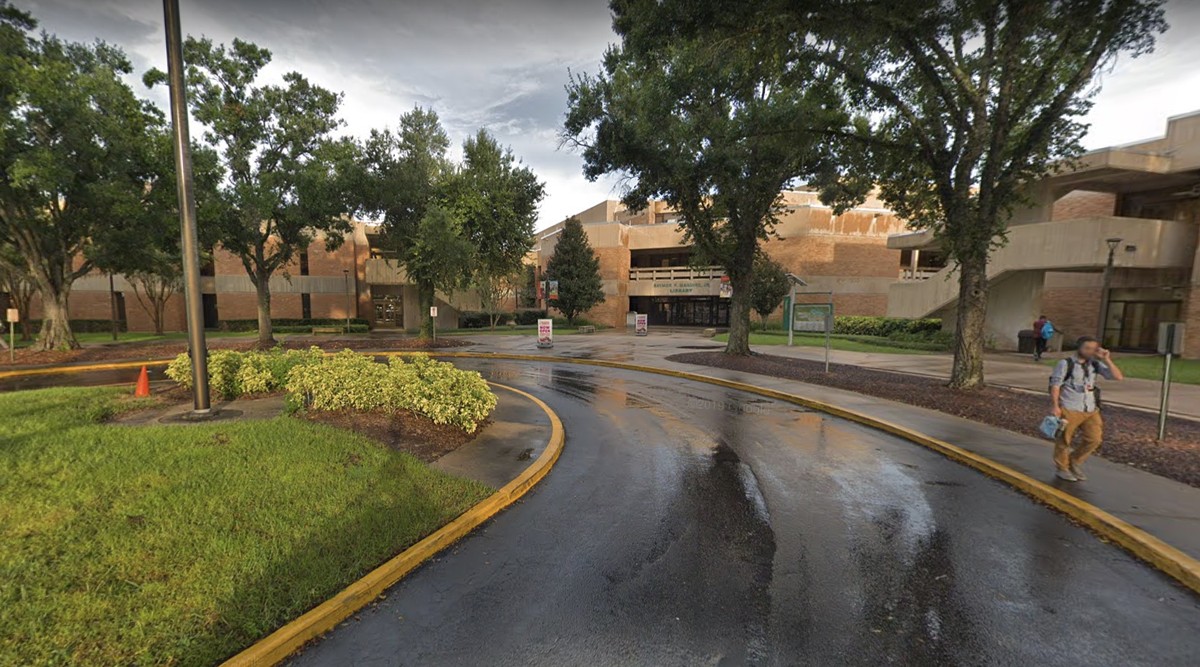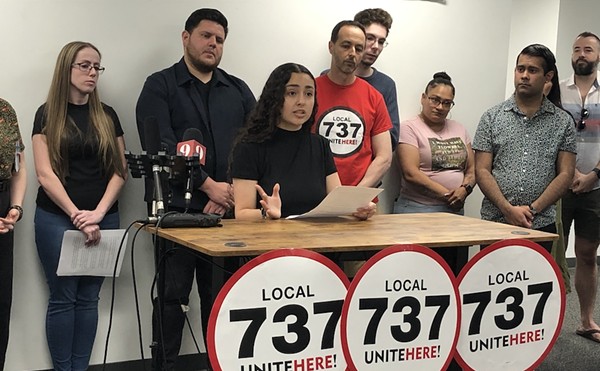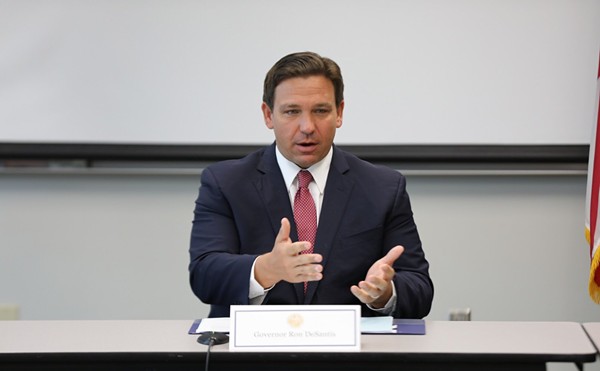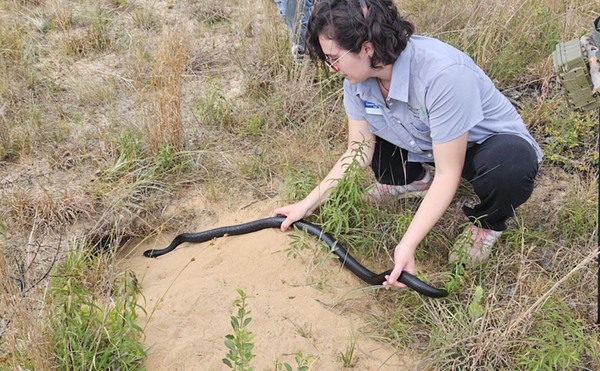Tony Anaya, an 84-year-old former adjunct professor at Valencia College, wasn't planning to submit his letter of resignation to the college last September. After working in Valencia College's Global Languages department for nearly two decades and helping design its Continuing Education International program, Anaya says the college failed to provide the technological accommodations he needed in the early days of the pandemic to continue teaching courses virtually. Namely, a functioning laptop.
"The threats of losing my course load have caused me to feel so overwhelmed through all of this that I've had anxiety attacks and trouble eating and sleeping," Anaya told Dissent magazine in April of 2020. "Just last week I lost my sole remaining course. No worker should have to experience this sort of anxiety and upheaval in the middle of a pandemic."
Without the requested laptop loan, unable to teach his courses virtually, Anaya lost his course load after April, thereby severing his primary source of income. According to Anaya himself, as well as a GoFundMe campaign organized by one of his former colleagues, this caused significant financial difficulties for the seasoned professor.
In mid-December, Anaya was visited by former colleagues of his who are fighting to form a union with SEIU Faculty Forward, an academic labor union that represents 57,000 faculty and graduate student workers nationwide.
Anaya, who has been involved with the adjuncts' move to unionize, told Orlando Weekly he was contacted by one of the SEIU organizers, who got in touch with him to let him know Valencia's adjunct organizing committee would be dropping off a holiday meal for him. This delivery, Anaya said, consisted of canned foods, a ham, baked goods, fresh fruit and a $100 Publix gift card. He says he doesn't know how he was chosen as a recipient for delivery, but that he's "eternally grateful."
Anaya admitted that, over the past 10 months of unemployment, his savings account has become significantly depleted. Earlier that year, as the number of positive coronavirus cases soared across the state, Valencia College moved nearly all of the college's courses online, with only a select few to be taught in person. Anaya said his department wasn't adequately prepared for this.
Without a functioning laptop to meet the necessary technological requirements, Anaya says he contacted Valencia's technology department to ask if it would be possible for them to loan a laptop. They told him he would have to contact his supervisor to submit a formal request for equipment.
When contacted by email, a spokesperson for Valencia College told Orlando Weekly that the college did move to provide laptops to faculty and instructors who requested them, using operational funds as the college transitioned in-person classes to a virtual classroom of online courses.
Anaya, however, says that he contacted his supervisor about getting a laptop and that nothing happened. His request, he says, "I would consider, it was ignored." And as a result, his classes were given to another professor. He didn't receive any classes before his retirement in September, which he says was a decision influenced by several factors, including his time at the college, the lapse of his course load during the pandemic and health issues.
"I didn't feel like it was the right way to do it," Anaya said, of his decision to retire. "I would have liked to go out the front door, instead of the back."
Although Anaya previously lived alone, after losing his wife a decade prior, he had to leave his apartment earlier this year and is now sharing an apartment with his son, who also lives in Orlando. Even so, "it's still expensive," he says. The average rent for an apartment in Orlando is $1,449.
Anaya told Orlando Weekly that he made about $25,000 a year at Valencia, prior to the complete lapse of his course load this spring, teaching 24 to 28 classroom hours. He also received about $13,000 to $15,000 a year through Social Security benefits.
According to the Massachusetts Institute of Technology's Living Wage calculator, a living wage in the United States in 2020 is $16.54 per hour, or $68,808 per year — although this can vary depending on where you live.
"At Valencia, we're paid poverty wages to teach our students," said Valencia adjunct professor of English Mark Rivera last year, during an event to support Florida's $15 minimum wage initiative. "We don't have health insurance; we have teachers who are living out of their cars as they're trying to do full-time work with part-time wages."
These working conditions, adjuncts say, contrast sharply with the amount of money Valencia administrators have reportedly spent on anti-union legal service through the labor and employment law firm Allen Norton & Blue.
Following the money
Public records forwarded to Orlando Weekly by SEIU show that Valencia paid Allen Norton & Blue lawyers $250 an hour — and over $10,000 in a single month — for legal services in 2018, when adjuncts first filed for a union election with SEIU Faculty Forward. And a spokesperson from the SEIU labor union told Orlando Weekly that Valencia College spent tens of thousands of dollars of public funds in 2020 alone to pay for union avoidance legal services from Allen Norton & Blue.
"As with any external legal process, Valencia has engaged counsel to advise the institution of its rights and assist us in navigating the PERC process, just as SEIU has done," Valencia's spokesperson told Orlando Weekly. Although the college confirmed they've spent between $230 to $250 an hour for legal fees, they say their monthly totals have been "significantly less" than $10,000 a month since adjuncts first began organizing in 2018.
Union avoidance is one of Allen Norton and Blue's areas of expertise — a fact recognized by state universities like Florida Polytechnic University, which paid the firm $27,155.41 to, in part, squash faculty efforts to unionize in 2018. (They failed, for the record.)
And this isn't a tactic unique to academic organizing. According to a report from the Economic Policy Institute, employers in the United States spend a collective $340 million on "union avoidance" consultants each year, generally for the purpose of framing unionizing efforts as labor's bogeyman.
And Valencia College isn't shy about their stance on faculty unions. They are explicit.
"The College prefers to remain nonunion and not have an unaffiliated third party interfering with our operations," they say on their website. "We believe that a union-free environment allows us to continue our tradition of being a forward-thinking academic institution." They encourage faculty to "educate" themselves on the decision to unionize and respond to organizers' outreach accordingly.
Valencia College is fully aware that adjuncts — who make up about 70 percent of their total faculty — are working with SEIU Faculty Forward to form a union. They've dedicated an impressive amount of space on their website to denigrating the outreach of union organizers and faculty leaders with the union. "Many faculty members have complained to us regarding these union interactions," they state. "These same faculty members had their work interrupted and felt intimidated by the way in which they were approached."
In a phone call with Orlando Weekly, Anaya disputed this. "That [statement] basically communicates their self-interest," he said, and a lack of commitment to the financial well-being of their adjunct faculty. "They're interested in their own bottom lines," Anaya added, "and their own six-figure salaries."
Early last year, Valencia College received one of the top 50 biggest bailouts among the nation's 5,100 higher education institutions from the CARES federal stimulus package. Adjuncts, and students with the Young Democratic Socialists of America who support adjuncts' fight to unionize, are asking that what remains of Valencia's $27.6 million bailout be put towards addressing the material needs and concerns of the college's staff and students.
As of Jan. 10, 2021, Valencia College has distributed $18,534,080 of emergency grant aid to 24,169 students of the college.
A September update from the college last year shared their plan to use up to $13.8 million in funding for "institutional stability," which they describe as funding for information technology capacity; training of faculty and staff; the promotion of a remote work environment; and emergency grants for eligible students. Another $13.8 million was allocated specifically for emergency student aid — to go toward expenses such as food, housing, course materials and healthcare. The college also received $1.7 million through the CARES Strengthening Institutions Program to support remote learning, revenue replacement, recovery of costs and student grant options.
Recently, more than 140 adjuncts at Valencia signed a letter directed to current Valencia College President Sandy Shugart and the College Board of Trustees regarding their concerns.
"As adjunct and non-tenure track faculty, our teaching conditions are in need of serious remedy," the letter, forwarded to Orlando Weekly via email, reads. "The COVID crisis has only exacerbated the precarious nature of our work."
The letter contained a list of demands to address concerns such as job instability, access to healthcare coverage and technology requirements for the virtual classroom. The letter also asks that the college allow adjuncts to hold a fair union election — free from the influence of a "union-busting" legal team.
According to SEIU, the state Public Employment Relations Commission confirmed in July of last year that Valencia adjuncts had "met the showing of interest" required to schedule a union election.
Even so, Valencia has reportedly delayed the process of agreeing to hearing dates, or suggested hearing dates, through their Allen Norton & Blue lawyers, according to the SEIU spokesperson who was reached by Orlando Weekly for comment. In September, Valencia adjuncts with SEIU Faculty Forward organized a car caravan in protest of the college's stalling, demanding that the administration allow them to schedule a hearing to vote on forming a union.
Adjuncts caring for adjuncts
Now retired from his position at Valencia, Tony Anaya fully supports faculty's move to unionize so that they can collectively negotiate for health benefits, tax cancellation fees, a livable wage and more.
Anaya knows that one concern from those who aren't yet on board is that they'll be fired if they join the fight to unionize.
But if they form a union and acquire a seat at the bargaining table, he says, they'll have a legal advocate for their labor conditions. "That's one of the purposes for a union, to have a third party there."
He knows that he will no longer benefit from adjuncts' move to form a union at the college.
"But it's OK," he says.
Anaya wants the younger college adjuncts working for the college — and the students who benefit from their instruction — to "not be intimidated."




















